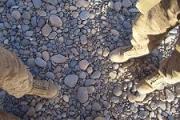The Lesson 1899-1902 (Boer War) - Rudyard Kipling
LET us admit it fairly, as a business people should,
We have had no end of a lesson: it will do us no end of good.
Not on a single issue, or in one direction or twain,
But conclusively, comprehensively, and several times and again,
Were all our most holy illusions knocked higher than Gilderoy’s kite.
We have had a jolly good lesson, and it serves us jolly well right!
This was not bestowed us under the trees, nor yet in the shade of a tent,
But swingingly, over eleven degrees of a bare brown continent.
From Lamberts to Delagoa Bay, and from Pietersburg to Sutherland,
Fell the phenomenal lesson we learned—with a fulness accorded no other land.
It was our fault, and our very great fault, and not the judgment of Heaven.
We made an Army in our own image, on an island nine by seven,
Which faithfully mirrored its makers’ ideals, equipment, and mental attitude—
And so we got our lesson: and we ought to accept it with gratitude.
We have spent two hundred million pounds to prove the fact once more,
That horses are quicker than men afoot, since two and two make four;
And horses have four legs, and men have two legs, and two into four goes twice,
And nothing over except our lesson-and very cheap at the price.
For remember (this our children shall know: we are too near for that knowledge)
Not our mere astonied camps, but Council and Creed and College—
All the obese, unchallenged old things that stifle and overlie us—
Have felt the effects of the lesson we got—an advantage no money could buy us!
Then let us develop this marvellous asset which we alone command,
And which, it may subsequently transpire, will be worth as much as the Rand.
Let us approach this pivotal fact in a humble yet hopeful mood—
We have had no end of a lesson, it will do us no end of good!
It was our fault, and our very great fault—and now we must turn it to use.
We have forty million reasons for failure, but not a single excuse.
So the more we work and the less we talk the better results we shall get—
We have had an Imperial lesson; it may make us an Empire yet!











 ) is that this led to the confident air (or arrogant demeanour whichever you prefer) of the British Officer becoming standard. As in when the troops arrive in (say) the Sudan and are faced by the spears and blades of the Mahdi's army and the troopies say "for fook sake!" it is up to the officers to strut their stuff with that air of cool/calm/collected/in-control/relaxed/outward-confidence designed to fool the troopies that they were in control of themselves and therefore the situation.
) is that this led to the confident air (or arrogant demeanour whichever you prefer) of the British Officer becoming standard. As in when the troops arrive in (say) the Sudan and are faced by the spears and blades of the Mahdi's army and the troopies say "for fook sake!" it is up to the officers to strut their stuff with that air of cool/calm/collected/in-control/relaxed/outward-confidence designed to fool the troopies that they were in control of themselves and therefore the situation.

Bookmarks